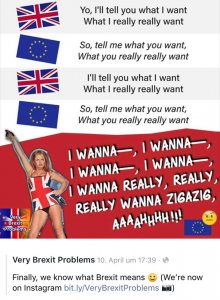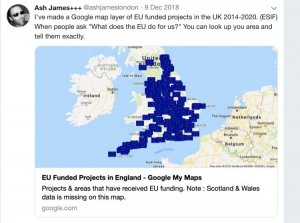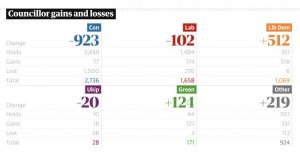Fri flyt av arbeidskraft er det altoverskyggende problemet og det som kommer til å ødelegge EU innenfra hvis de ikke regulerer dette. Det blir feil å argumentere med at «disse jobbene vil ingen brite (eller nordmann) ha». Disse jobbene er blitt uattraktive på grunn av lønnsmessig og sosial dumping etter den frie flyten.
Politikk, religion og samfunn Mens vi venter på Brexit
- Trådstarter Roald
- Startdato
Diskusjonstråd Se tråd i gallerivisning
-
“The government doesn’t appear to be shifting the red lines because they’ve got a big pressure in the Tory party that actually wants to turn this country into a deregulated, low-tax society which will do a deal with Trump. I don’t want to do that,” he (Corbyn) said.
https://www.theguardian.com/politic...alks-with-government-have-stalled-says-corbynFri flyt av arbeidskraft er det altoverskyggende problemet og det som kommer til å ødelegge EU innenfra hvis de ikke regulerer dette. Det blir feil å argumentere med at «disse jobbene vil ingen brite (eller nordmann) ha». Disse jobbene er blitt uattraktive på grunn av lønnsmessig og sosial dumping etter den frie flyten.
Nettopp. Det samme skjer her i landet også, men de fleste merker det ikke ennå. Britene har kommet lengre enn oss i å føle det på kroppen.
Snakket med en professor hvis datter var utdannet kjemiingeniør. Hun hadde gitt opp å få jobb og begynte som lærer. Opplevde at jobbene ble besatt av utlendinger. I "gamle dager" måtte arbeidsgiver dokumentere at kvalifisert arbeidskraft ikke kunne oppveies i Norge, før man ga arbeidstillatelse til utlendinger. I min tid på et par universiteter var det påfallende å observere at ansettelser i det private næringsliv tilsynelatende ikke lengre var primært basert på karakterer, men alder og kjønn. Når kompetansen er et overflodsgode (hele verden som rekrutteringsplass) er det andre kritierier som blir avgjørende for ansettelse.
I drosjenæringen har vi sett det samme, men her som følge av innvandring med påfølgende sosial dumping. Folk med støtte fra NAV og fritak fra kjentmannsprøve skal konkurrere mot nordmenn nedynga med boliglån. Kommer en slik å banker på døren til en drosjeeier og sier at jeg kan kjøre mens du ligge hjemme, så betyr det at flere biler kjører på tider av døgnet hvor antall kunder ikke er tilsvarende høyt. Dette gjør at det blir mindre inntekt på hver enkelt, slik at nordmannen med et inntektsbehov større enn de fra den tredje verden finner seg noe annet å gjøre.....Kjenner folk som har gått ned 30% i lønn fra ett år til et annet.Ccruiser
Gjest
Jeg er glad vi ikke har det som i gamle dager.Nei, det kan du si, men dessverre er det en del tegn i tiden som tyder på at vi er på tur tilbake dit..... egoismen har gode tider...
Utdyp gjerne...Lett å snakke om egoisme når man ikke sjøl er rammet. Pipa får fort en annen lyd når man står i det....Ccruiser
Gjest
Litt for enkelt å skylde på "utlendinger".. Jeg er ikke helt overbevist om at det ikke er mulig for etnisk norske ingeniører å få jobb, så det kan hende man gjør seg en bjørnetjeneste med den unnskyldningen.
Jeg jobber i en norskeid bedrift, det er hvertfall 15 nasjonaliteter representert. Er ganske overbevist om at dette er et stort pluss for bedriften ettersom en stor del av kundene ikke er i Norge og ikke minst en berikelse både faglig og på annet vis for de som jobber der.
Jeg forstår ikke helt hvordan du kunne vurdere ansettelsespraksis i privat næringsliv fra en posisjon på et offentlig universitet, men fra min synsvinkel er det definitivt kompetanse som gjelder. Men kompetanse er mye mer enn bare karakterer. Det er også personlige egenskaper (dvs kompetanse i å samarbeide med andre) og erfaringsgrunnlag fra jobber og fritidsaktiviteter. I min gruppe er en mastergrad med bra karakterer i et relevant fagområde en del av minstekravet for i det hele tatt å passere den første silingen av CV’er, deretter er det en rekke intervjuer som forsøker å teste ut ulike egenskaper hos kandidatene før den endelige vurderingen. Som regel er det til slutt personlige egenskaper som avgjør. Når vi rekrutterer nyutdannede har vi gjerne 50-100 søkere, men når vi er ute etter en helt bestemt kompetanse må vi ofte bruke hodejegere med Norden som søkeområde. Det er definitivt ikke så enkelt som bare å la HR-avdelingen rangere alle søkere etter karakterer og gi et tilbud til den øverste i bunken.I min tid på et par universiteter var det påfallende å observere at ansettelser i det private næringsliv tilsynelatende ikke lengre var primært basert på karakterer, men alder og kjønn. Når kompetansen er et overflodsgode (hele verden som rekrutteringsplass) er det andre kritierier som blir avgjørende for ansettelse.
For ingeniører og mellomledere er forøvrig ikke lønningene i f eks Norge, Sverige og Tsjekkia så veldig ulike. Lønnsforskjellene er små i Norge, så disse stillingskategoriene er relativt billige her. Vi sparer ingen penger på å ansette en svenske eller tsjekker i stedet. Derimot er lavt utdannede og ufaglærte stillingskategorier uforholdsmessig dyre i Norge. Arbeidsintensiv industri uten spesielle krav til kompetanse er ikke levedyktig her, men havner fort i land med langt lavere lønnskostnader.Sist redigert:
Det ser man ut fra hvilke studenter som får jobb, hvor fort de får jobb og hvilke jobber de får. Hverken karakterer eller personlighet syntes å ha noe med saken å gjøre.Jeg forstår ikke helt hvordan du kunne vurdere ansettelsespraksis i privat næringsliv fra en posisjon på et offentlig universitet, men fra min synsvinkel er det definitivt kompetanse som gjelder. .
Det var forøvrig veldig dårlig stemning ved UIO i 2001/2002 da jeg hadde midlertidig stilling der. Oljeindustrien var da i en fase der de knapt ansatte noen. Den dårlige stemningen skyldes at de eneste som fikk jobb var de to pene jentene med (virkelig) dårlige karakterer.....Sist redigert:
Det er sikkert et stort pluss for bedriften, men flere og flere faller utenfor å må betale prisen for dette mangfoldet; lønnsnedgang eller en annen karriere. Til slutt vil de protestere. Derfor Brexit. Derfor gule vester. Det kommer hit også...Jeg jobber i en norskeid bedrift, det er hvertfall 15 nasjonaliteter representert. Er ganske overbevist om at dette er et stort pluss for bedriften ettersom en stor del av kundene ikke er i Norge og ikke minst en berikelse både faglig og på annet vis for de som jobber der.Ccruiser
Gjest
Du mener kompetansebedrifter henter billige polske ingeniører og presser ut de norske?
Nei. Henter billige Polske transportarbeidere.Du mener kompetansebedrifter henter billige polske ingeniører og presser ut de norske?
Men begge deler er konsekvenser av fri flyt av arbeidskraft. Det vil bli et ras mot bunnen....Ccruiser
Gjest
Erstatter de kjemiingeniører med transportarbeidere?HHardingfele
Gjest
Husker jeg var imponert over antallet EU-prosjekter som hadde bidratt til at turistnæringen i Wales fremstod som i verdensklasse. Oppgradering av parker, historiske bygninger, muséer, osv.
"What did the Romans ever do for us?"
https://www.google.com/maps/d/viewe...&ll=52.630657186946806,-2.295161699999994&z=6
 G
GGjestemedlem
Gjest
Farage har vel gitt opp Ukip for lenge siden og startet et nytt parti. "The Brexit Party" Du finner dem under 'Other' vil jeg tro (dog vet jeg ikke om de stiller i lokalvalgene så ta det med en klype salt.) Jeg er dog ikke det spor forbauset, og også litt glad, over at liberaldemokratene har fått et kraftig oppsving. De har tross alt vært klinkende klar i sin europavennlige posisjon hele tiden. Jeg håper de får mer innflytelse over britisk politikk i tiden som kommer. Landet trenger et levende liberalt parti (liberalt i europeisk tradisjon vel og merke).Virker som om folk har fått nok av UKIP. Farage trodde partiet ville få mengder av seter ...
Vis vedlegget 540019GGjestemedlem
Gjest
Erdogan, den sosialistiske islamdiktatoren i Tyrkia, føler seg nok inspirert av de britiske remainerne, og han også vil også ha en "final say" siden hans parti tapte valget av borgermester i Istanbul.
https://www.bbc.com/news/world-europe-48190351Det er bevegelse:
Nigel Farage’s Brexit party is on course to secure more support at the European elections than the Tories and Labour combined, according to the latest Opinium poll for the Observer.
In the most striking sign to date of surging support for Farage, the poll suggests more than a third of voters will back him on 23 May. It puts his party on 34% of the vote, with less than a fortnight before the election takes place.
https://www.theguardian.com/world/2...on-votes-than-tories-and-labour-combined-pollIkke akkurat den store optimismen hva angår EUs overlevelsesprognose:
Majority of Europeans expect end of EU within 20 years
Three in 10 think conflict among EU countries is a realistic possibility, survey finds
https://www.theguardian.com/world/2019/may/15/majority-of-europeans-expect-end-of-eu-within-20-years
Og dette på tross av at:
With the latest Eurobarometer statistics showing that two-thirds of Europeans have positive feelings towards the EU – the highest recorded since 1983 – the ECFR’s director, Mark Leonard, said the onus was on pro-European parties to awaken the “silent majority”.
He said: “There are seven days to resolve the paradox at the heart of the European project. Support for EU membership is at the highest level since 1983, and yet a majority of voters fear the EU might collapse. The challenge for pro-Europeans is to use this fear of loss to mobilise their silent majority and ensure that it is not just the anti-system parties who get their say on 26 May.
Det blir neppe bedre når vi nå sannsynligvis får et EU-parlament fullt av representanter som ikke akkurat «elsker« EU. Farage sitt Brexitpart står sterkt på øya, og han har jo selv ytret at han vil til Brussel for å gjøre livet så jævlig som mulig for EU. Og hva de EU-skeptiske høyrepopulstene vil oppnå, med sine nasjonalistiske identitetsprinsipper, annet enn å demontere EU, er det ikke helt lett å få øye på. De ikke helt heldige politiske endringer i Ungarn og Polen er, slik jeg ser det, muliggjort på basis av deres parasitære forhold til EU; vi elsker pengene deres, men ikke alt det andre dillet. Vel, et EU som mer og mer blir dominert av nasjonalistiske strømninger vil kanskje ikke forbli den melkekua de samme bevegelser så sårt trenger.Det er nok samme fenomen som i USA. GOP velger inn rabulister som ikke er det minste interessert i å styre landet, men bare reiser til DC «to strangle the beast». Soyabøndene i Midt-Vesten har likevel ikke noe imot å ta imot stadig mer offentlige penger fra Trump etter hvert som han raserer markedene deres. Så mye for «free trade» og økonomisk frihet fra statlig innblanding.Denne linken er meget relevant både som forklaring på Brexit og Euroskepsis.
https://youtu.be/lzbAOE4qfDwGodt jobbet, Brexiteers. British Steel hadde greid en omstilling til lønnsomhet, men så kom Trumps straffetoller på stålimport og usikkerheten rundt Brexit, and belly-up. Synd med de tusenvis av arbeidsplasser i britisk industri som berøres av kollapsen. Men dette var vel det de stemte for da de stemte på populister som Farage.
https://www.bbc.com/news/business-48365241
https://www.theguardian.com/busines...vency-after-rescue-talks-with-government-fail
https://www.dn.no/industri/british-...-tusenvis-av-arbeidsplasser-i-fare/2-1-608261Sist redigert:ta overføringene fra parasittene!
Kaczyński told a conference organised by Catholic Action, a lay group that promotes Catholic values, that LGBT rights and “gender theory” were an existential threat.
“These ideologies, philosophies, all of this is imported, these are not internal Polish mechanisms,” Poland’s most powerful political figure told the gathering in the central city of Włocławek. “They are a threat to Polish identity, to our nation, to its existence and thus to the Polish state.”
https://www.theguardian.com/politic...x-and-religion-dominate-campaigning-in-polandGGjestemedlem
Gjest
Mange interessante resultater i EU-valget i helgen. UK er intet unntak:
The Brexit Party and the Liberal Democrats have been the big winners across England and Wales in the European elections.
Nigel Farage's party has taken 28 of the 64 seats in England and Wales, while the Liberal Democrats have 14 MEPs - up from just one five years ago.
It has been a horrific night for the Conservatives, with just three MEPs - putting them in fifth place overall.
Labour has so far only seen 11 MEPs elected, while the Greens have seven.
https://www.standard.co.uk/news/pol...ter-race-after-raab-and-leadsom-a4151711.htmlNeste uke vil de to kaostrådene, Brexit & Trump, gå opp i en høyere enhet når besøket fra helvete ankommer med en helvetes pinlig timing.
Trump kommer på offisielt statsbesøk 3-5 juni og vertenes statsminister er "a lame duck", eller "in office, but not in Power".
Flere britiske politikere nekter å møte han. Det blir en privat mottagelse i stedet for offisiell mottagelse hos Dronningen i Buckingham Palace. Man prøver å tone ned hans tilstedeværelse ved markeringen av D-dagen. Gresskaret kommer selvsagt til å tråkke i salaten og la hele greia dreie seg om han.
Det offisielle Storbritannia stålsetter for en uke full av pinligheter.
Heldigvis for dem har de århundrer av øvelser med "stiff upper lipp", elevert dannelse, innstuderte manerer og stive tradisjoner og støtte seg på.Og Labour får blø grunnet utydelig lederskap:
https://www.theguardian.com/politic...port-for-second-referendum-after-voter-exodusPolls in the run-up to the European elections showed that voters did not understand Labour’s position on Brexit. Conference had voted to leave all options on the table to stop a destructive Tory Brexit and our position has been fairly straightforward.
HAHAHAHA
Videre:
The reason we are in this mess is because those in government who engineered the original referendum had no idea what to do if they lost.
Sant nok, men: HAHAHAHAHA. Det er alltids noen å klandre for selv å gå fri
Slik snakker man der alt går an uten at noe skjer. Eller: Hvordan ta politisk stilling til en av de største enkeltsakene i landet og finne løsningen i å ikke ta stilling.
For en gjeng!
https://www.theguardian.com/comment...eferendum-bring-country-together-leave-remain
Kafka sitter i helvete og ler!
Tillegg:
Labour shouldn’t be the party of leave or remain, but a force to unite the country
Utlagt: Vi er hverken for eller mot abort, men la oss be sammen…Sist redigert:Intervju med Michel Barnier, the European Union’s chief negotiator on Brexit i NYR.
Yes, Jean-Claude regrets that he did not intervene in the campaign, nothing else. His point in saying that is that he might have been able to correct some of the lies that were told. However, the reasons for Brexit run deeper. We have to take into account the popular sentiment in Britain. For Britain, it’s probably too late, but it’s not too late for other countries where we have exactly the same problems, including my country.
Looking at the causes of Brexit, we also find typically British reasons: the hope for a return to a powerful global Britain, nostalgia for the past—nostalgia serves no purpose in politics. In my country, too, some politicians still prefer to live in the past. But there were, also, people voting for Brexit who simply don’t want to accept rules. Some based in the City of London voted to leave, as they don’t want to accept the Union’s regulations on their trading; they want to speculate freely and the Union doesn’t allow them to do so.
Finally, and most importantly, there are many people who feel abandoned. They feel that the quality of public services, healthcare, transport, is worsening. We must listen to these fears and address them.
https://www.nybooks.com/daily/2019/...-no-purpose-an-interview-with-michel-barnier/
Synspunkt på det irske problem!
Og de fire friheter:
The British wanted us to agree to divide the famous four freedoms—free movement of people, goods, capital, and services—in what was often called cherry-picking. Why can the four freedoms not be divided? Technically, it would be possible, after all.
It’s a question of the fundamental reality of the single market, which is not a supermarket. Freedom of movement for goods, services, capital and, most importantly, freedom of movement for people are fundamental to the single market. The EU is not only an economic project; it’s also a political project. It’s also much more than a free-trade zone. The single market is a social, economic, and legal ecosystem, where, between twenty-eight countries, we have decided to live together, adopt the same standards and protection for consumers. Therefore, we cannot agree to cherry-picking.Sist redigert:Brexit kaoset fortsetter. Sitat fra Reuters:
An opinion poll published this week showed a majority of Conservative Party members - who will make the final decision on Britain's next prime minister in July - would accept losing Scotland from the United Kingdom as long as Brexit is delivered.
Sent from my iPhone using TapatalkGGjestemedlem
Gjest
Are you suffering from Boris Derangement Syndrome?
https://www.spectator.co.uk/2019/06/are-you-suffering-from-boris-derangement-syndrome/
In the US, Trump Derangement Syndrome, or TDS, is a well-established phenomenon. The journalist Fareed Zakaria defined it as ‘hatred of President Trump so intense that it impairs people’s judgment’ and it has led to well-respected columnists describing him as a ‘fascist’, a ‘white supremacist’ and a ‘Nazi’. ‘Just how similar is Trump to Hitler?’ asked an opinion piece in Time magazine after his election. Some people were so badly affected by Trump’s victory it made them psychologically ill. Students at Kansas University were offered ‘therapy dogs’ on election night, while at Vanderbilt they were encouraged ‘to take advantage of the outstanding mental health support the university offers’.
So far, Boris Derangement Syndrome, or BDS, hasn’t reached those heights, but we’re not far off. In a New York Times article last July entitled ‘Boris Johnson has ruined Britain’, a prominent, left-of-centre British journalist took issue with his decision to resign as foreign secretary. ‘It is a desperate move by a man who has lost almost all the credibility he had three years ago,’ she wrote. ‘As one of his allies told me last month: “He knows that the verdict of history is about to come down on him — and bury him.”’GGjestemedlem
Gjest
Boris Johnson var en god borgermester i London og jeg er sikker på at han blir en god partileder og statsminister. At det venstrevridde rasket snur seg i gravene er bare et sunnhetstegn. Alternativet med Corbyn og hans motbydelige kommunistbrigade i Momentum er til å få frysninger av. Og det tror jeg de fleste briter også forstår etterhvert. -
Laster inn…
Diskusjonstråd Se tråd i gallerivisning
-
-
Laster inn…







